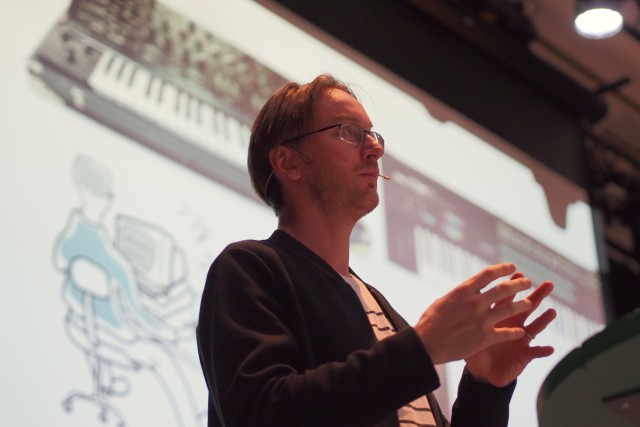Courses at the University of Oslo for which I have been the course convenor and/or main teacher:
-
MCT4010 — Research Methods, Tools and Issues in MCT (2018, 2019). The aim of the course is to develop knowledge of and skills in various research methods, tools and issues in the field of music, communication and technology.
-
MCT4021 — Physical-Virtual Communication and Music 1 (2018). The aim of this course is to learn to operate and maintain the Portal, the audio-visual communication platform connecting the two campuses in Trondheim and Oslo. The Portal constitutes a laboratory for network based collaboration and communication.
-
MUS2830 — Interactive Music (2012, 2013, 2017). This course introduces students to musical human-computer interaction, performance with live electronics, and the basics of sound/music programming and hardware hacking. The students develop a new, small software/hardware instrument in class each week, and we perform together in class and in a couple of concerts. I developed and ran the course by myself.
-
MUS2821 — Sound skills 2 (2012). This course extends the knowledge gained from Sound Skills 1 (see below), and focuses on the acoustics of musical instruments and soundscapes. I taught advanced techniques for sound analysis and synthesis in PD.
-
MUS2801 — Sound skills 1 (2011, 2012). This course introduces the students to sound theory, acoustics, and sound analysis/synthesis. My contribution has been to teach students synthesis and sampling in PD.
-
MUS4830 — Music, Technology, Production (2011). This master’s course presents basic issues in music technology and production, and gives students the chance to critically reflect on their own practice with technologies in musical contexts. I gave about half of the lectures on basic issues in music technology, and supervised semester projects.
-
MUS4831 — Sound Analysis (2010, 2011, 2012) (co-taught with Rolf Inge Godøy). This master’s course covers a broad range of methods and techniques for sound perception and analysis. My contribution has been to teach sound analysis methods, and the use of Spear, Sonic Visualiser and Matlab.
-
MUS2006 — Music and Movement (2010, 2011, 2012, 2013). This course introduces students to the field of embodied music cognition, based on a mix of lectures by myself and other researchers in the Department, and four workshops devoted to learning methodological skills in video analysis and motion capture. I initiated and developed the course, wrote course material, and have been administrating it since the start.
-
MUS2800 — Sound theory 1 (2010). This course introduces the students to sound theory and acoustics. I taught the course alone, as a substitute teacher.
-
MUS2820 — Sound theory 2 (2010). This course extends the knowledge gained from Sound theory 1 (see above), and focuses on the acoustics of musical instruments and soundscapes. My contribution was to teach more advanced techniques for sound analysis and synthesis in PD.
-
MUS2860 — Sound programming 2 (2004, 2005, 2008, 2009, 2010, 2011). This course focused on the development of larger software projects in Max/MSP/Jitter, as well as basic electronics using Arduino and Phidgets. I developed the study program for the course, developed course material, and taught it by myself. This course has now been merged with Sound theory 2 into the new course Sound skills 2, and parts of what was taught in this course is now taught in Interactive Music.
-
MUS2840 — Sound programming 1 (2003, 2004, 2005, 2006, 2007 2008, 2009, 2010 ). This course introduced students to sound/music programming in Max/MSP, including synthesis and sampling. I developed the study program for this course, developed course material, and taught it by myself. This course has now been merged with Sound theory 1 into the new course Sound skills 1.
-
I have also held a number of separate lectures in other courses at the bachelor, master, and Ph.D. levels.
Courses taught at the Norwegian Academy of Music:
-
MUSTEK53 — Live electronics (2010, 2011, 2012). I taught full-day workshops on musical electronics (Phidgets) and laptop orchestra performance.
-
KOMPTEK20 — Compositional techniques with electronics (2008). This course was based on teaching compositional techniques in Max/MSP for the composition students.
-
MSTEKUT70 — History and aesthetics of music technology (2008). This course gave a broad introduction to the influence of music technology on music throughout the 20th century.
During the period 2006-2012 I was involved as a teacher in the International Summer School in Systematic Musicology:
-
University of Hamburg (2012). I gave a lecture on the analysis of music-related body movements, and held a workshop on motion capture.
-
University of Jyväskylä (2009). I gave a lecture on the analysis of music-related body movements using video analysis methods, and supervised student projects.
-
Gent University (2006, 2007, 2008). I gave workshops on using the Musical Gestures Toolbox for the analysis of music-related body movements, and supervised student projects.
